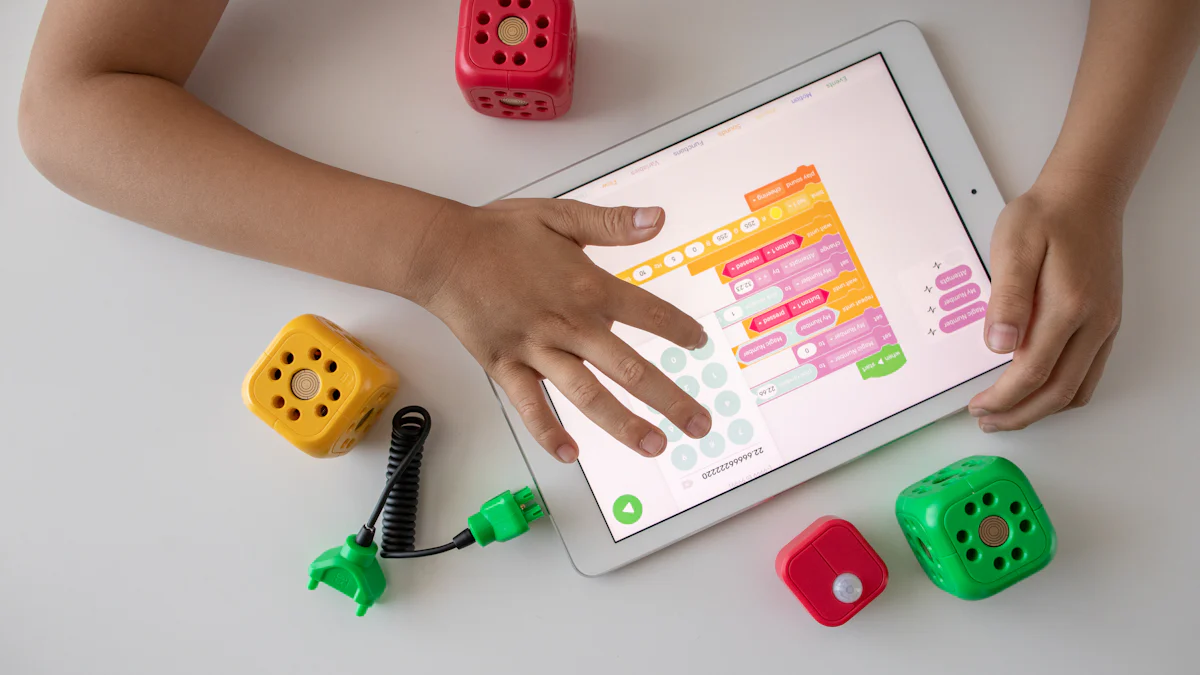Building Emotional Resilience in Children: A Practical Guide for Parents

Build Emotional Resilience in children to prepare them for life's challenges. Children need strong Emotional foundations to navigate emotions like anxiety, sadness, or fear. Parents play a crucial role in fostering Resilience. Kids often mirror their parents' Emotional states. A supportive environment helps children thrive. Consistent routines provide stability and enhance time management skills. Emotional Resilience in kids empowers them to handle adversity with confidence. Parents can create a nurturing atmosphere where children feel safe to express emotions. Building Emotional Resilience equips children with tools for a brighter future.
Creating a Supportive Environment for Emotional Growth

Building emotional resilience in children begins with creating a supportive environment. Kids USA Montessori emphasizes the importance of nurturing spaces where children feel secure and valued. This foundation allows emotional growth to flourish.
Establishing a Strong Parent-Child Relationship
A strong parent-child relationship forms the cornerstone of emotional resilience. Parents can foster this connection through trust and open communication. Kids need to know that their feelings matter.
Building Trust and Open Communication
Trust develops when parents listen actively. Encourage kids to share their thoughts and emotions. Create an atmosphere where children feel heard. Open communication builds confidence and emotional resilience.
Encouraging Emotional Expression
Children benefit from expressing their emotions freely. Encourage emotional expression through activities like drawing or storytelling. Kids USA Montessori supports these creative outlets, allowing children to process feelings constructively.
Providing a Safe and Stable Home
A safe and stable home environment is essential for child development. Consistency and routine offer children a sense of security. Kids USA Montessori emphasizes the importance of structure in fostering emotional resilience.
Consistency and Routine
Consistency helps children manage expectations. Daily routines reduce anxiety and enhance focus. Jennifer Weil Malatras highlights that predictable routines prevent time management issues later in life. Parents should set boundaries around mealtimes and bedtime.
Physical and Emotional Safety
Physical and emotional safety are crucial for children. A safe home environment allows kids to explore and learn without fear. Kids USA Montessori ensures that children feel protected and supported. Emotional safety encourages resilience and self-assurance.
Teaching Practical Skills for Emotional Resilience
Teaching practical skills for emotional resilience empowers children to face life's challenges with confidence. The Montessori approach emphasizes the importance of equipping kids with these essential skills. Children learn best in environments that support their emotional development.
Problem-Solving and Decision-Making
Problem-solving and decision-making are crucial components of emotional resilience. Kids need opportunities to practice these skills in a supportive setting. Montessori education supports resilience by encouraging independent thinking and guiding children through challenges.
Encouraging Independent Thinking
Encouraging independent thinking helps children build confidence. Kids learn to trust their instincts and make decisions. Montessori education supports lifelong learning by fostering curiosity and exploration. Children develop emotional resilience when they feel empowered to think for themselves.
Guiding Through Challenges
Guiding children through challenges teaches them valuable lessons. Kids learn that setbacks are part of growth. Montessori education supports emotional development by providing a safe space for trial and error. Children gain resilience by understanding that mistakes are opportunities for learning.
Developing Emotional Intelligence
Developing emotional intelligence is vital for children's overall well-being. Emotional intelligence involves recognizing and managing emotions effectively. Montessori education supports emotional growth by nurturing these skills in children.
Recognizing and Naming Emotions
Recognizing and naming emotions helps children understand their feelings. Kids benefit from activities that encourage emotional expression. Montessori education supports emotional awareness by providing tools for self-reflection. Children become more resilient when they can articulate their emotions.
Empathy and Understanding Others
Empathy and understanding others are key aspects of emotional intelligence. Kids learn to connect with peers and appreciate diverse perspectives. Montessori education supports emotional connections by promoting collaborative activities. Children develop resilience through empathy and social interactions.
Scientific Research Findings:
Regular routines promote time management skills and reduce attention difficulties in adulthood.
Family stability links to emotion regulation and social/emotional adjustment in adolescents.
Montessori education supports emotional resilience by creating environments where children thrive. Developing emotional resilience equips kids with the tools needed for a brighter future.
Encouraging a Growth Mindset in Children
Encouraging a growth mindset in children transforms how they perceive challenges and setbacks. Children with a growth mindset view difficulties as opportunities for learning and growth. Montessori education plays a pivotal role in nurturing this mindset. USA Montessori supports emotional and cognitive development by creating environments where children thrive.
Embracing Challenges
Children who embrace challenges develop resilience. Montessori education prepares children to see obstacles as stepping stones. This approach fosters a positive attitude towards learning and personal growth.
Learning from Mistakes
Mistakes serve as valuable learning experiences. Children learn to analyze what went wrong and how to improve. Montessori education encourages reflection and self-assessment. This process builds emotional resilience and confidence.
Celebrating effort and progress reinforces a growth mindset. Children feel motivated when their hard work is acknowledged. Montessori education emphasizes the importance of recognizing achievements. This practice boosts self-esteem and perseverance.
Celebrating effort and progress reinforces a growth mindset. Children feel motivated when their hard work is acknowledged. Montessori education emphasizes the importance of recognizing achievements. This practice boosts self-esteem and perseverance.
Setting Realistic Goals
Setting realistic goals helps children focus on achievable targets. Children learn to balance ambition with practicality. Montessori education guides children in setting both short-term and long-term goals.
Short-term and Long-term Planning
Short-term goals provide immediate objectives. Long-term goals offer a vision for the future. Children benefit from planning and strategizing. Montessori education prepares children to break down tasks into manageable steps.
Adjusting Goals as Needed
Flexibility in goal-setting is crucial. Children learn to adapt when circumstances change. Montessori education teaches children to reassess and modify goals. This adaptability strengthens emotional resilience.
Case Studies:
Family Stability and Development: Family stability links to time management and attention skills in children. Consistent routines foster emotional resilience.
Impact of Consistent Schedules: Consistent schedules benefit children's development. Predictable routines enhance focus and reduce anxiety.
Montessori supports emotional development by encouraging a growth mindset. USA Montessori Helps Children build emotional resilience through structured environments and nurturing guidance. Children develop emotional resilience when they embrace challenges and set realistic goals.
Benefits of a Daily Routine for Emotional Resilience

Daily routines offer significant benefits for children. Establishing a routine provides structure and predictability. This stability supports emotional resilience. Children thrive in environments where they know what to expect. The Montessori approach emphasizes the importance of consistent routines. This method helps children develop emotional resilience.
Structure and Predictability
Structure and predictability reduce anxiety. Children feel secure when they know what comes next. A predictable schedule minimizes uncertainty. This approach fosters emotional resilience. Children learn to manage their emotions better.
Reducing Anxiety
Routines help children feel calm. Regular schedules reduce anxiety by providing a sense of control. Children experience less stress when they follow a familiar routine. Emotional resilience grows as children learn to handle daily challenges.
Enhancing Focus and Productivity
A structured routine enhances focus and productivity. Children concentrate better when they know what tasks lie ahead. This clarity boosts emotional resilience. Children become more efficient and confident in their abilities.
Balancing Activities
Balancing activities is crucial for emotional resilience. Children need time for work and play. A balanced schedule supports emotional growth. Montessori education encourages this balance. Children learn to manage their time effectively.
Time for Work and Play
Children benefit from a mix of work and play. Structured activities develop skills and discipline. Playtime fosters creativity and relaxation. This balance strengthens emotional resilience. Children learn to navigate challenges with ease.
Importance of Rest and Relaxation
Rest and relaxation are vital for emotional well-being. Children need downtime to recharge. Adequate rest supports emotional resilience. Children handle challenges better when they feel rested. Montessori education values the importance of rest. This approach nurtures emotional resilience in children.
Survey Results:
292 undergraduate students participated in a survey.
Participants rated the regularity of childhood activities.
Findings highlight the link between routines and emotional resilience.
Montessori education supports emotional resilience through structured routines. Children develop emotional resilience by balancing activities and maintaining a predictable schedule. This approach prepares children for life's challenges.
Modeling Positive Coping Strategies and Altruism
Modeling positive coping strategies helps children build emotional resilience. Children learn how to manage strong emotions by observing adults. Parents can demonstrate healthy ways to handle stress and adversity. Montessori education supports this approach by encouraging emotional awareness.
Managing Strong Emotions
Managing strong emotions is crucial for emotional resilience. Children need techniques to calm down during overwhelming moments. Parents can guide children through these processes.
Techniques for Calming Down
Deep breathing exercises provide a simple way for children to relax. Counting slowly or visualizing a peaceful scene can also help. Montessori classrooms often incorporate calming activities to support emotional balance. These techniques empower children to regain control over their emotions.
Healthy Expression of Feelings
Healthy expression of feelings allows children to communicate effectively. Art, music, or writing can serve as outlets for emotions. Encouraging children to talk about their feelings fosters emotional resilience. Montessori education emphasizes open communication and emotional expression.
Encouraging Altruism
Encouraging altruism nurtures empathy and connection. Children who engage in acts of kindness develop a sense of purpose. Altruism enhances emotional resilience by fostering community bonds.
Acts of Kindness
Simple acts of kindness can make a significant impact. Children can help a friend, share toys, or offer compliments. These actions build emotional connections and strengthen resilience. Montessori environments encourage cooperation and kindness among peers.
Volunteering and Community Involvement
Volunteering provides opportunities for children to contribute positively. Participating in community activities fosters a sense of belonging. Children learn the value of helping others and develop emotional resilience. Montessori programs often include community service projects to instill these values.
Mercedes Samudio highlights that parents strive for perfection. The reality is that neither parents nor children are perfect. Embracing imperfections builds resilience.
Children thrive in environments where emotional resilience is nurtured. Modeling positive coping strategies and encouraging altruism prepare children for life's challenges. Montessori education supports these principles by creating supportive and empathetic spaces.
Building emotional resilience in children involves practical strategies. Parents can create supportive environments and model positive coping skills. Encourage emotional expression and problem-solving. Embrace the growth mindset to help children face challenges. Daily routines provide structure and predictability. These practices nurture emotional strength.
Parents should implement these strategies with patience and consistency. Remember, perfection is not the goal. Mercedes Samudio reminds us that neither parents nor children are perfect. Emotional resilience offers long-term benefits. Children equipped with these skills handle adversity with confidence and optimism.
See Also
The Importance of Teaching Kids Emotional Regulation Skills
Promoting Emotional Wellness in Children: Self-Care Strategies
5 Steps to Cultivating Resilience in Your Child
Encouraging Boys to Express Their Emotions: Parenting Tips
Transforming Parenting Practices to Raise Resilient Children

